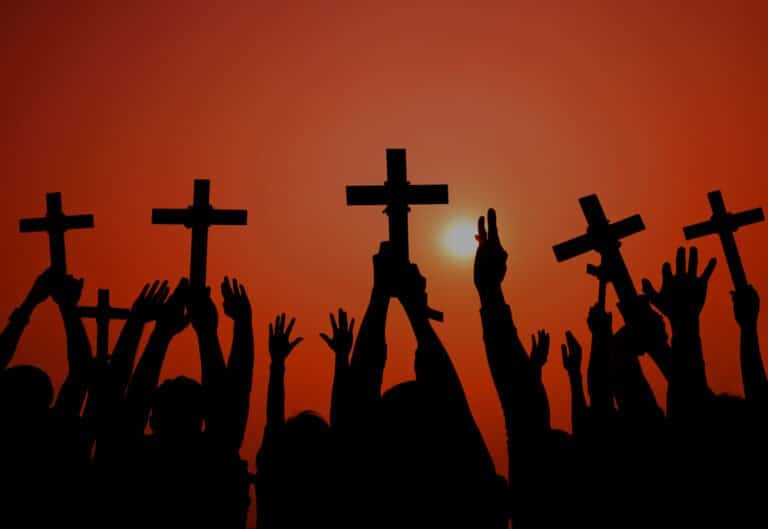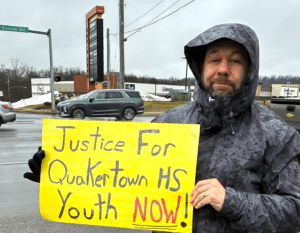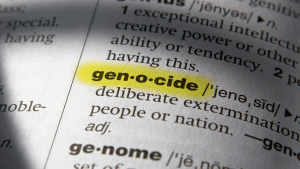The leaders of the U.S.-based charismatic New Apostlic Reformation movement are spreading their influence into Latin America. NAR leaders, including Che Ahn of Harvest Rock Church, Cindy Jacobs, and Charles Stock from the Harrisburg-based Life Center Church, among many others, have traveled across the hemisphere meeting with Church leaders in Guatemala, Peru, Brazil, Argentina, and elsewhere strengthening their networks and spreading their message.
Stock has traveled to Peru on a number of occasions, including in November 2023 where he met with Peruvian congresswoman Milagros Aguayo, who was a key activist in the far-right anti-LGBTQ+ Don’t Mess With My Kids movement before she was elected to congress.
The regressive theocratic ideas they present build off the far-right positions that already exist in Latin America, but also filtrate through the churches in the region.
“They are direct influences,” Paulo Gracino de Souza Jr, a Brazilian professor of political sociology at the University of Brasilia, says. “They bring these pastors from the United States for conferences and such and these ideas circulate not only in large churches here in Brazil, but also in small churches because many of the pastors of smaller churches attend seminars in the large churches.”
These networks support each other when ideal policies are enacted. This is best captured by the discourse of Christian Nationalist and Seven Mountain Mandate promoter Lance Wallnau, who during a recent conference on business leadership, praised the governments of Javier Mieli in Argentina and Nayib Bukele in El Salvador, who was recently re-elected to the presidency in spite of re-election being prohibited by the country’s constitutional, for their libertarian and heavy handed authoritarian policies that have been taken in those countries.
In the past Wallnau has promoted Guatemala’s previous far-right government. In an appearance on the Flashpoint stream in March 2023, Wallanu referred to Guatemala during the conservative administration of Alejandro Giammattei (January 2020 to January 2024) as “a model for America” after the conservative president self declared the country the “pro-life capital of Ibero-America.”
Guatemala continues to suffer from extreme levels of violence, one of the highest rates of childhood malnutrition in the hemisphere, and a worsening crisis caused by poverty. These factors drive millions of Guatemala to seek to migrate to the United States, often using coyotes connected to evangelical churches.
During his visit to Guatemala, Wallanu was accompanied by Ahn and Jacobs for the commemoration of the first anniversary of the declaration of the country. While there they met with the members of the country’s highest court, the Constitutional Court, and attended a religious ceremony in the country’s congress for the commemoration, which included evangelical pastors utilizing the Jewish Shofar in order to “remove the devils” from congress.
While the ceremony was largely ignored by both the population and political analysts, columnist for the Prensa Libre daily newspaper, Mario Antonio Sandoval, who also is the President of the Guatemalan television channel Guatevision, decried the ceremony. He pointed out that it was a violation of the norms in the Central America country since since 1871 Guatemala was a secular country.
“It constitutes a mixture of disrespect and also ignorance because it calls for ‘freedom of religion’,” Sandoval wrote, condemning the presence of Ahn, Wallnau, Jacobs, and Guatemalan pastor Moises Fuentes. “Frankly, the obvious plan to delay the country’s legal system by mixing political issues and institutions with religious themes is scary.”
Guatemala is not the only country to pursue anti-LGBT+ and anti-women legislation.
On May 10 in Peru, President Dina Boluarte issued a decree declaring at least seven gender identities, including transgenderism and intersexuality, as “mental illness.” Declarations such as this join other legislation that has arisen following support from evangelical lawmakers, including legislation that prohibited the use of inclusive language in state educational textbooks.
The adoption of such policies and positions in Latin America is not isolated.
“Evangelical conservatism in Latin America has a lot of influence from missionaries,” Rolando Pérez Vela, a Peruvian communications professor at the Pontifical Catholic University of Peru who has increasingly researched the spread of far-right forms of neo-pentecostal Christianity in the South American country, told the Bucks County Beacon.
“The issues of no homosexuality, no abortion, and the [promotion of the nuclear] family have always been a part of the agenda of these churches,” he explained. “What is new is that these churches, these evangelical groups, have begun to have a greater presence in the public political space, partly because they have begun to realize that they cannot remain a [political] minority.”
Decades of Organizing
Across the hemisphere evangelical and Pentecostal forms of Christianity have exploded in the last two decades, in a region that was originally dominated by the Catholic Church. In Peru, for instance, evangelicalism has grown to represent between 16-22 percent of the population; in Brazil 22-25 percent; and in Guatemala, which has one of the largest evangelical populations in Latin America, evangelicalism today represents over 40 percent of the population, according to a 2022 Gallup poll.
This rise in evangelicalism has shifted into an increasing influence in politics, building off the networks laid by the Christian Reconstructionist movement, the Moral Majority, and other right-wing evangelical movements of the 1980s. Today the NAR is building off the networks that were laid decades prior.
READ: Pennsylvania’s Prayer Warrior: Abby Abildness and Her Dominionist Crusade in the Commonwealth
These branches are not unified, but as Kristin Du Mez, a history professor at Calvin College in Grand Rapids, Michigan and author of the New York Times best selling book Jesus and John Wayne: How White Evangelicals Corrupted a Faith and Fractured a Nation, says, they are moving in the same direction.
“We’re living with the fruits of that now but it has been they’ve been building this for more than 50 years,” said Du Mez.
“There is overlapping that is at work and there’s adjacent networks and they’re all kind of pushing in the same direction,” Du Mez explains. “But they are not overlapping directly, there are only edges overlapping, but not the centers overlapping.”
U.S. Far-right Fuels Election Denialism
The support from the Christian Dominionist movements have helped fuel election denialism throughout the region.
On January 8, 2023, thousands of supporters of Jair Bolsonaro, who had lost the 2022 elections to progressive President Luiz Inácio Lula da Silva, attacked government offices in protest of the election results. The event was compared to the January 6, 2021, attacks on the U.S. Capital by supporters of Donald Trump who denied the results of the 2020 elections.
In Guatemala a campaign led by the far-right, with Trump’s controversial former ambassador to Germany Richard Grenell, made accusations of fraud in the election that saw Progressive candidate Bernardo Arévalo win the presidency. On January 14 Arévalo assumed office after months of attempts by Guatemala’s embattled Attorney General María Consuelo Porras to derail his assumption to office in what has been referred to as an attempted coup d’etat.
Accusations of election interference swirled around the assumption of Arévalo in January 2024, with the country’s far-right accusing the administration of Joseph Biden of interfering in the elections, especially as the Biden administration was one of the key voices backing democracy as Indigenous communities blocked highways in defense of democracy.
The Chrisitan supremacist movement has echoed these accusations of fraud. In a tweet from February 2024, Lance Wallnau suggested that the Biden administration had interfered in the Guatemalan election, as well as the 2022 election in Brazil.
Their allies in the U.S. Congress too have sought to stoke the accusations of interference.
On May 7, 11 conservative members of the United States House of Representatives issued a letter to United States Secretary of State Anthony Blinken and USAID director Samantha Powers seeking to draw their attention to unfounded accusations by Guatemala’s far right that the United States and the Biden Administration intervened in the electoral process and in protest of the sanctions levied against Attorney General Porras.
“Officials from the U.S. Department of State and USAID have no legitimate authority to press for ideological changes in Guatemala that compromise their Constitution or deeply held values concerning life and family,” the letter read, echoing far-right narratives in Guatemala. “We are disturbed by reports of the involvement of State officials in Guatemalan affairs – and of other conservative nations around the globe.”
Several of the signatories of the letter have connections with the Christian Nationalist movement backing Trump in the United States. These include Warren Davidson (R-OH 8th District) and Maria Elvira Salazar (R-FL 27th District), who both gave a speeches to leaders of the New Apostolic Reformation at the February 2024 far-right National Gathering for Prayer and Repentance, while Scott Perry (R-PA 10th District) has collaborated with the leaders of the New Apostolic Reformation as recently as February 2024.
But the United States continues to provide an example of what is possible for the global far-right movement, especially as Donald Trump seeks the U.S. Presidency again in November 2024. The far-right feels empowered and legitimized by the movement in the United States.
“I think it provides a model at the very least of what this can look like,” Du Mez says. “There’s a sense of possibility [for those on the far-right] of if you can do this in the United States and if American democracy is apparently this susceptible and the power of this right-wing Christianity.”






